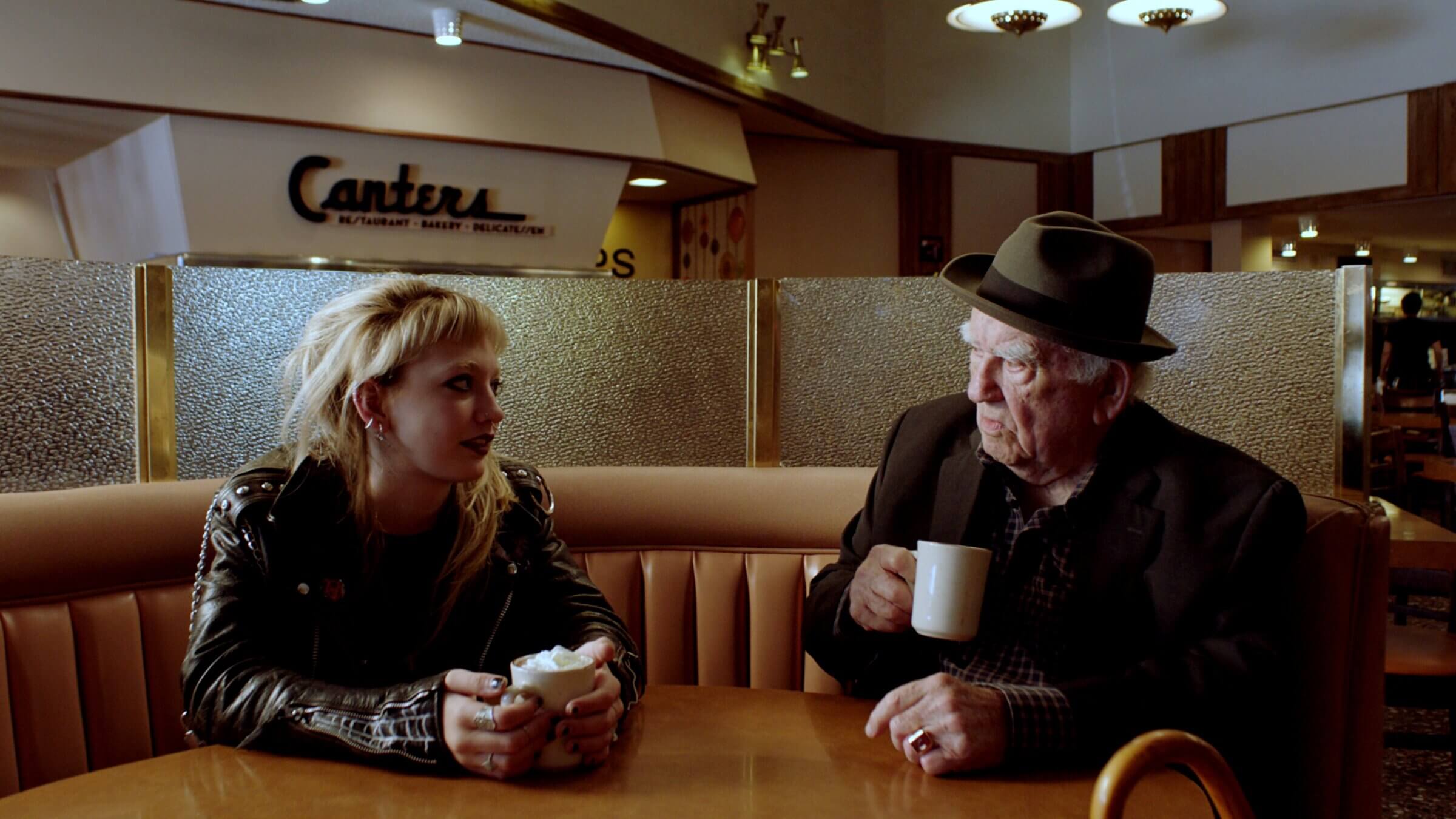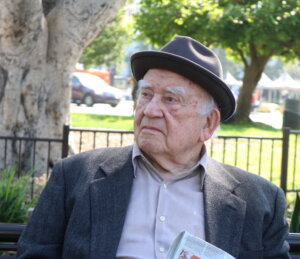For Ed Asner, a posthumous triumph in a less-than-triumphant final film
The actor delivers a bravura performance as a Holocaust survivor in ‘The Tiger Within’

Margot Josefsohn and Ed Asner in The Tiger Within Courtesy of Menemsha Films
Short of the late Ed Asner’s nuanced, haunting, indeed, memorable performance, The Tiger Within is predictable, awash in stereotypes, devoid of original insights, and the ending is, well, just plain implausible.
Still, it is timely. It zeroes in on the surge in American antisemitism, Holocaust denial and most central, the pervasive ignorance, at least in some quarters, regarding these topics.
Set in the ’80s, it’s a two-hander starring Asner (1929-2021) in his last film role playing Samuel, an introspective Holocaust survivor and widower, living alone in a dreary Los Angeles neighborhood. His co-star is the impressive newcomer, Margot Josefsohn as Ohio-born Casey, a foul-mouthed tattooed 14-year-old punk who has run away from her alcoholic, indifferent mother (Erica Piccininni) and Mom’s abusive boyfriend (Jonathan Brooks).
Casey is all set to move in with her LA-based long absentee father (James C. Victor) and his new family until she overhears their cruel observations about her and she darts off yet again. Homeless, penniless and living on the streets, Casey encounters Samuel and their lives are forever changed. Hers is radically transformed thanks to their improbable relationship, more precisely, her experience with the kindness of a stranger.
On paper, the idea is not uninteresting. Pete Hamill covered similar territory, admittedly with a touch of magical realism, in his vivid and evocative novel, Snow in August that portrayed the growing bond between an Orthodox rabbi and an Irish Catholic youngster in Brooklyn, in the late ’40s. But Hamill’s novel feels organic unlike Tiger which teaches life lessons — forgiveness and redemption are the big ones — and brings to mind an Afternoon Special or maybe an educational film with R-rated adult content. Worse, much of the narrative is propelled by coincidences and overheard conversations.
Written by Gina Wendkos (The Princess Diaries), and directed by Rafal Zielinski, who got his start directing teen sex comedies in the ’80s, Samuel and Casey’s relationship unfolds at a Jewish cemetery where he routinely visits the grave site of his beloved late wife. Leaving the grounds he spies a teenage girl sleeping alongside a tombstone, sporting torn fishnet stockings and a leather jacket adorned with a swastika. He is at once repelled, fascinated and even empathetic. He feels sorry for the homeless teen.
What makes Asner’s performance so striking is how he subtly registers conflicting emotions simultaneously. His facial expressions, vocal pauses, and even his gait (it’s the stooped shuffle of an old man) embody a complex life that is largely defined by routine and memory. One suspects he does not realize how lonely he is until he meets Casey.

Asking nothing in return, he invites her to his home for a meal and shortly thereafter offers her room and board, no strings attached, except erasing the spray-painted swastika from her jacket. She complies. Having grown up believing the Holocaust was a myth, through him, she learns about the Holocaust for the first time.
Casey fills a two-tiered emotional gap for Samuel: his emptiness (perhaps, boredom) and, as he clearly states, his unfulfilled promise to his late wife to try to overcome his almost free-floating hatred of everyone.
“God presented me with a challenge,” he tells Casey. “If I could learn to forgive you, a child in a swastika, then I could learn to forgive everybody.” In lesser hands the sentiment would be far-fetched and more than a tad yucky. But Asner makes it credible. His love and ongoing mourning for his wife is palpable.
In all fairness, there are tidbits of nice dialogue and well-observed interchanges between the two protagonists. Some of their idiosyncratic behaviors are on target. I especially liked Samuel beating a raw egg and slurping it down rather than cooking it as an expression of his own self-apathy.
Regrettably, though, the creative team wasn’t satisfied with recounting a small story. Instead, they felt compelled to weigh it down with heavy-handed meaning, nowhere more pointedly than in Samuel’s advice to Casey: “Embrace the tiger,” (hence the title) suggesting “own, celebrate, and overcome your fears and/or rages and/or demons and/or whatever.” This from a Holocaust survivor who lost both his children in the camps? Really? The New Age pablum is even more impossible to swallow than usual, especially as it’s the narrative’s central conceit. In varying degrees both Samuel and Casey are on journeys to achieve that end.
Casey, an aspiring artist who is sketching throughout the story (lots of superimposed animated drawings depict her evolving moods), is finally drawing tigers in the wake of a terrible tragedy. Inspired, she visits a local zoo and looks a tiger in the eye or she imagines she does or she dreams it. Either way, her tiger paintings grow increasingly bold. She, in turn, becomes braver and more functioning. She lands a boyfriend (Diego Josef ) too.

None of this is the actor’s fault. Josefsohn does a fine job evoking an emotionally battered, high-risk youngster who is so deadened she has no problem making a few bucks as a scantily clad sex worker in a massage parlor, and has mastered a vacuous look and style as a survival tactic.
Still, the picture belongs to Asner, and represents a glowing curtain call for an actor whose career spanned almost seven decades. Although he was best known as the irascible broadcast editor Lou Grant on The Mary Tyler Moore Show and its eponymous dramatic spinoff Lou Grant, he appeared in nearly 300 TV programs and films (including Roots, Fort Apache, The Bronx and the widely poplar Elf and Oscar-winning Up). He earned seven Emmys, five Golden Globes, and a Screen Actors Guild Life Achievement Award.
I interviewed Asner in 2012 when he starred on Broadway, fulfilling the then-82-year-old actor’s wish to return to the Great White Way after a 23-year absence following his appearance in a revival of Born Yesterday. The new drama, Grace, traced the convoluted relationships between the owners of Gospel-themed motel, a deeply troubled neighbor (Michael Shannon) and a German-born exterminator, Karl (Asner), who is attempting to come to terms with his own tormented past.
Commenting on the play’s religious themes Asner said, “I don’t believe in God, though I’m not prepared to call myself an atheist either. You know the old phrase: ‘There are no atheists in foxholes.’ I’ve never been in a foxhole and if I ever find myself in a foxhole I’ll let you know if I believe in God or not.”
The Kansas City–born actor and activist grew up in an Orthodox Jewish home, albeit one with a decidedly Midwestern influence. “My father was so religious he wouldn’t even eat in the shul,” Asner said. “But we didn’t walk to shul. We took the car.”
Asner said he was no longer a religious Jew, though he identified with Judaism culturally, “meaning I would hope if they began killing all Jews I’d rise to the occasion to say, ‘I’m pretty tasty.’” Long pause. “But if I’m a good progressive human being I’d say the same if they were killing all gypsies. I’d put on a gold earring and scarf and say, ‘hey, stranger, what about me?’” At the end of the interview he cryptically remarked, “Bury my ashes in Mount Scobus.”
It seems oddly fitting that in his final performance in this posthumously released film, Asner plays not simply a Jew, but a Holocaust survivor. One only wishes the movie was on par with his artistry.





















